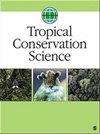Local Knowledge and Use of Pangolins by Culturally Diverse Communities in the Forest-Savannah Transition Area of Cameroon
IF 1.6
4区 环境科学与生态学
Q2 BIODIVERSITY CONSERVATION
引用次数: 8
Abstract
Information about the presence and population status of pangolins, and the threats they face, remains limited in many parts of Cameroon, a country that is home to three species of pangolin and considered to be a global hub of pangolin trafficking. Local communities living in rural areas can provide valuable information on species presence, local uses of wildlife, and possible threats, that is useful for prioritising conservation actions. Using interview surveys in 20 villages surrounding Mbam and Djerem National Park, we investigated local peoples’ knowledge of pangolin presence, perceptions of population trends, cultural importance, consumptive and non-consumptive uses, and hunting of pangolins. Our results showed that most people recognised the white-bellied and giant pangolins, but only 10% recognised the black-bellied pangolin. Ethnolinguistic group significantly affected the likelihood of respondents recognising and having seen a pangolin before. Giant pangolin populations were perceived to be declining, particularly by older respondents. We found evidence of local use of pangolins for meat, but few respondents reported uses of scales. Cultural significance was reported by few respondents, but when it was reported it mostly referred to giant pangolin. White-bellied pangolins are reportedly hunted using bare hands for local consumption most frequently, whilst giant pangolins were mainly hunted for local consumption and income generation using wire snares. Overall, our study shows the possible value of local knowledge for planning and prioritising conservation actions for pangolins. We highlight the urgent need to monitor pangolin populations, and assess the possible impacts to pangolins from threats such as hunting.喀麦隆森林-大草原过渡地区文化多样性社区对穿山甲的当地知识和利用
在喀麦隆的许多地区,关于穿山甲的存在和种群状况以及它们面临的威胁的信息仍然有限。喀麦隆有三种穿山甲,被认为是全球穿山甲贩运中心。生活在农村地区的当地社区可以提供有关物种存在、当地野生动物使用和可能威胁的宝贵信息,这有助于优先考虑保护行动。通过对姆巴姆和杰雷姆国家公园周围20个村庄的访谈调查,我们调查了当地人对穿山甲存在的了解、对种群趋势的看法、文化重要性、消费和非消费用途以及对穿山莲的狩猎。我们的研究结果表明,大多数人都认出了白腹和巨型穿山甲,但只有10%的人认出了黑腹穿山甲。民族语言群体显著影响了受访者识别和见过穿山甲的可能性。人们认为巨型穿山甲的数量正在下降,尤其是老年受访者。我们发现了当地使用穿山甲作为肉类的证据,但很少有受访者报告使用了鳞片。很少有受访者报道文化意义,但当报道时,大多指的是巨型穿山甲。据报道,白腹穿山甲最常见的狩猎方式是徒手供当地食用,而巨型穿山甲主要是用铁丝网供当地食用和创收。总的来说,我们的研究表明了当地知识对规划和优先考虑穿山甲保护行动的可能价值。我们强调迫切需要监测穿山甲种群,并评估狩猎等威胁对穿山甲的可能影响。
本文章由计算机程序翻译,如有差异,请以英文原文为准。
求助全文
约1分钟内获得全文
求助全文
来源期刊

Tropical Conservation Science
BIODIVERSITY CONSERVATION-
CiteScore
3.60
自引率
5.90%
发文量
16
审稿时长
>12 weeks
期刊介绍:
Tropical Conservation Science is a peer-reviewed, open access journal that publishes original research papers and state-of-the-art reviews of broad interest to the field of conservation of tropical forests and of other tropical ecosystems.
 求助内容:
求助内容: 应助结果提醒方式:
应助结果提醒方式:


